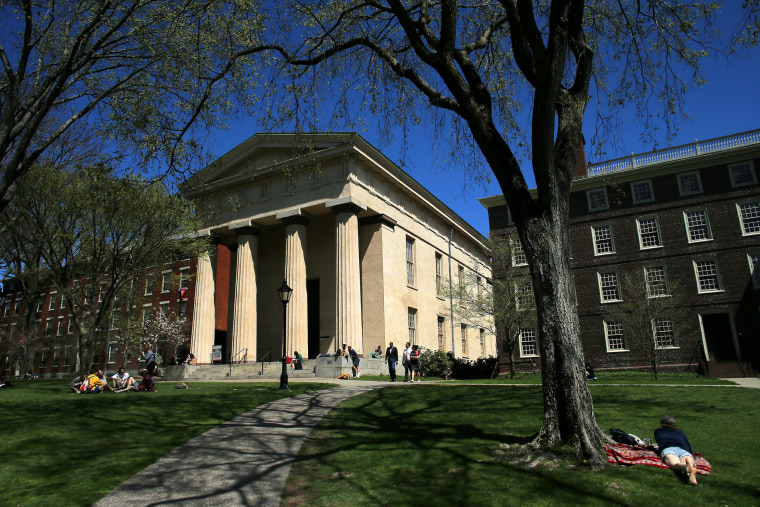Brown University suspended its chapter of Students for Justice in Palestine after the group led a rally protesting the university's decision not to divest its endowment from certain companies that support Israel.
Chapter members were told of the suspension Thursday, the group said, nearly a week after its Oct. 18 protest.
The suspension is a “retaliatory, politically-motivated ploy to defame protestors, fracture the student movement, and detract from their complicity in the extermination of the Palestinian people,” the group said in a statement Sunday.
Brown University said that because of the “severity of alleged threatening, intimidating and harassing actions,” it has initiated a review of SJP and required the chapter to “cease all organization activities.”

Members of the group, which belongs to the Brown Divest Coalition, said members were told they are prohibited from holding any activities, events or meetings or posting on social media.
“By prohibiting SJP from holding any events, including our weekly vigils, the administration has debilitated the sole organization on this campus dedicated to holding space for collective grief amidst the indiscriminate slaughter of Gazans carried out by the Zionist regime,” the group said in a statement.
The university said that while its policies make it clear that holding protests is a “necessary and acceptable means of expression on campus,” it argued that the protest led to the intimidation and harassment of administrators, members of Brown’s governing board and staff workers.
The university said it received reports from personnel that protesters were “banging on vehicles, physically blocking passage of a vehicle, screaming profanity at individuals at close and personal range, profanity and a racial epithet directed toward a person of color, and following and screaming at individuals while filming them.”
“As a campus community, we should be resolute that these behaviors are not acceptable, are not reflective of the Brown student body or our community as a whole, and are not commensurate with what we expect of ourselves and others,” it said in a statement.
Brown Divest Coalition first led a series of protests in April calling for the university’s governing board to divest. While university officials did review a student proposal outlining why the board should divest from 10 companies, it ultimately decided not to do so.
The university’s governing body voted against the proposal on Oct. 8, with students organizing a protest in response on Oct. 18.
Brown Divest Coalition said the university’s leadership “has shown us time and again that their investments in genocide take precedent over the dignity of the Palestinian people.”
Brown is one of several colleges and universities that have suspended pro-Palestinian groups amid ongoing protests, including Temple University, Tufts University, Rutgers University, American University and the University of Vermont.
Harvard University has suspended 25 professors and more than 60 law students from using the school’s flagship library after they held a protest on campus this month.
